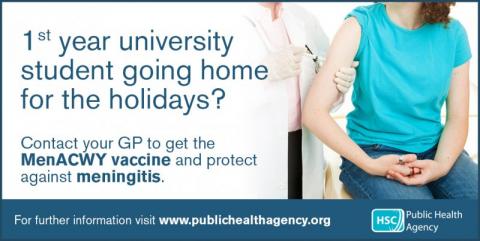First year student going home for the holidays? Get the meningitis vaccine – it could save your life

First-time university students are being encouraged by the Public Health Agency (PHA) to get the meningococcal vaccine if they haven’t already done so.
The new vaccine, which became available in August, protects against four different causes of meningitis and septicaemia – meningococcal A, C, W and Y diseases.
The immunisation programme is asking everyone born between 2 July 1996 and 1 July 1997, and first time university students up to the age of 25, to get the MenACWY vaccine if they didn’t get it before starting university.
Dr Lucy Jessop, Consultant in Health Protection at the PHA, said: “At this time of year many students travel back to the family home for the holidays, so it’s the ideal time for them to contact their GP and book an appointment to get the MenACWY vaccine. It could save their lives.”
Meningococcal bacteria can cause meningitis (inflammation of the lining of the brain) and septicaemia (blood poisoning). Both diseases are very serious and, especially if not diagnosed early, they can kill.
Dr Jessop continued: “MenW was rare in the UK but there has been an increase in cases in recent years. Older teenagers are at higher risk of getting MenW disease, so you need to get vaccinated to help protect yourself. It will also reduce the risk of you carrying the bacteria, therefore also protecting those around you.
“Those who have started university for the first time usually mix with larger groups of people, making them more exposed to various infections or diseases. The best way to protect against meningococcal A, C, W, or Y disease is to get the vaccine now if you didn’t get it before starting university.”
Even if students have recently had the MenC vaccine, it is advised that they should still get the MenACWY vaccine. It will increase protection against MenC and provide protection against the three other meningococcal groups.
From January 2016, the MenACWY vaccination will also start to be rolled out to all 14 to 15 year olds through the schools immunisation programme, and from April 2016 to 16 and 17 year olds by their GPs.
It is still important to know the signs and symptoms of meningitis and septicaemia and seek medical help immediately if you, or someone you know, experiences them.
Look out for any of these symptoms:
- Fever, cold hands and feet
- Vomiting and diarrhoea
- Drowsiness, difficult to wake up
- Irritability and/or confusion
- Dislike of bright lights
- Severe headache or muscle pains
- Pale, blotchy skin with or without a rash
- Convulsions/seizures
- Stiff neck.
The early symptoms of meningococcal disease are similar to those of flu, so you need to be able to recognise the symptoms very quickly even if you have been vaccinated as the vaccines offered through the routine immunisation programme do not protect against all forms of the disease.
There are five main groups of meningococcal bacteria that can cause meningitis and septicaemia – A, B, C, W and Y. The same bacteria that cause these serious diseases can also be carried in the back of the nose and throat, especially in young adults.
For more information on the MenACWY vaccination programme visit www.bit.ly/Men-Sep
